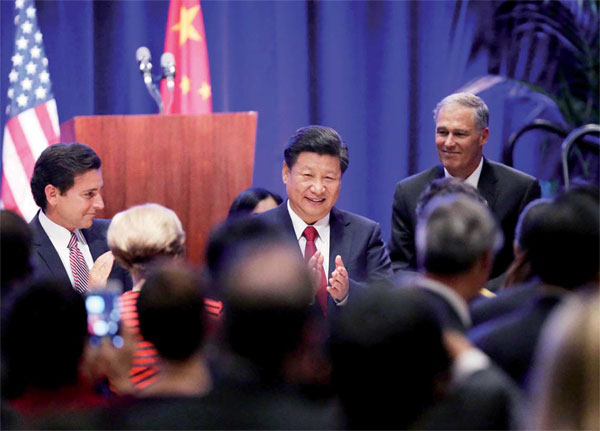Xi: We must build trust, collaborate more
Chinese president addresses 'thorny issues', including cybersecurity, economy on his first stop on US visit
Building stronger mutual trust, increasing trade and collaborating on cyberspace issues have been the biggest talking points since President Xi Jinping's arrival in the United States.
The Chinese leader, on his first state visit to the country, landed in Seattle on Sept 22 and attended several key meetings during his first two days.
|
President Xi Jinping attends a welcome dinner in Seattle on Sept 22 hosted by the Washington state government and groups friendly to China. Liu Weibing / Xinhua |
Xi addressed several issues in his first speech, which he made at a banquet to welcome the president and first lady Peng Liyuan, hosted by the Washington state government and communities in Seattle.
"We want to see more understanding and trust and less estrangement and suspicion, to forestall misunderstandings and miscalculations," the president said.
He went on to reference the Thucydides trap, a term coined by an American political scientist to describe when a rising power causes fear in an established power.
"There is no such thing," Xi said, "but if major countries make the same mistakes of strategic miscalculation time and again, they may create such traps for themselves."
To address the pessimism surrounding his country's current economic situation, he noted that all economies face difficulties and the downward pressure on China's economy was "only a problem in the course of progress".
"We will take coordinated steps to achieve stable growth, deepen reform, adjust structures, improve livelihoods and prevent risks, all while strengthening and innovating macro regulation to keep the growth at a medium-to-high speed," Xi said.
At the third China-US Governors Forum on Sept 22, Xi also charted a three-point proposal for the development of bilateral cooperation at the local level, covering economic potential, and sharing the benefits brought by domestic reform and the countries' complementary advantages.
He said China is pressing ahead with the transcontinental Belt and Road Initiative - a plan involving major infrastructure and connectivity projects to create a Silk Road Economic Belt and the 21st Century Maritime Silk Road - and all countries are welcome to contribute, including the US.
He also expressed support for an initiative to send 50,000 Chinese and American young people to study in each other's countries over the next three years, as well as plans to launch a China-US Year of Tourism in 2016.
During a visit to Boeing's factory in Seattle on Sept 23, the Chinese president hailed the US aircraft manufacturer as a "role model" for mutually beneficial economic and trade cooperation between the world's two largest economies.
"(As long as) China-US relations are developing well, American enterprises will continue to enjoy better conditions when it comes to cooperation with China," Xi said.
The previous day, several Chinese companies signed a deal with Boeing to buy 300 aircraft. Commercial Aircraft Corp of China also reportedly signed a deal with the company to build a 737 aircraft completion center in China.
"We support large American businesses setting up regional headquarters or research and development centers in China, and we encourage more small- and medium-sized enterprises to expand into China," Xi added at a China-US CEO roundtable in Seattle on Sept 23. "China also will continue to increase its investment in the US."
More than 30 business leaders from top companies, including Alibaba, Lenovo, IBM and Microsoft, attended the roundtable.
Xi assured them: "China's economic fundamentals remain solid and the country will continue to maintain steady long-term growth at a medium-to-high speed."
On the issue of cybersecurity, the president said at the eighth annual China-US Internet Industry Forum that China and the US need to "embark on constructive dialogue", adding that no one is able to stay out of the issue.
The forum, organized by the Internet Society of China and held at Microsoft's headquarters in Redmond on Sept 23, was attended by Chinese and American Internet elites, including Jack Ma, founder and executive chairman of Alibaba Group; Microsoft CEO Satya Nadella; and Ginni Rometty, chairwoman and CEO of IBM.
China upholds building a cyberspace with peace, security, openness and cooperation, Xi said, and called on all countries to stipulate Internet policies that correspond to their national conditions.
The president also touched on cybersecurity in an interview with The Wall Street Journal ahead of his state visit, as well as in his speech at the welcome dinner on Sept 22.
"Both China and the US are major cyberspace countries. They have important interests and room for cooperation," Xi said in his speech.
"Both sides should work on the basis of mutual respect and trust and embark on constructive dialogue, forging a new highlight of China-US cooperation and making cyberspace better benefit people in the two countries and around the world."
This month, China and the US reached an important consensus on combating cybercrime during a visit to the US by Xi's special envoy, Meng Jianzhu, a member of the Political Bureau of the Central Committee of the Communist Party of China and head of the committee's Commission for Political and Legal Affairs.
Su Ge, president of the China Institute of International Studies, says the two sides are expected to not shy away from thorny issues, including cybersecurity, during Xi's state visit.
"The meetings this year will give them an opportunity to work on confidence-building plans in regard to cybersecurity," he said.
Yuan Peng, vice-president of the China Institutes of Contemporary International Relations, adds that, after the recent ups and downs in the Chinese stock market and the sluggish US economy, the world is also expecting "joint efforts by the leaders of the two largest economies to shape a landscape of mutual benefits".
Wu Jiao in Washington, Yang Yixi in Beijing and Xinhua contributed to this story.
zhangyunbi@chinadaily.com.cn



















